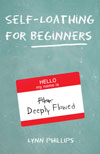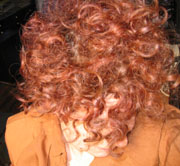 In US cinema, self-loathing in the line of duty was pretty much this year’s theme, making it hard to award SL4B’s coveted SLOscar to just one performance in the category: “Best Depiction of Self-Loathing.”
In US cinema, self-loathing in the line of duty was pretty much this year’s theme, making it hard to award SL4B’s coveted SLOscar to just one performance in the category: “Best Depiction of Self-Loathing.”
In Eastern Promises, Viggo Mortensen’s “Nikolai” had to become London’s top Russian mafioso in order to fight crime effectively. He ended up defaced by sinister tattoos and the splatter of underworld butchery, feeling too slimey to claim a woman’s love. That was also, more or less, the plot of Sweeney Todd, the vengeful barber and class warrior, magnificently portrayed in puddles of stage blood by Johnny Depp. Both actors were quite convincing and, more importantly, attractively miserable.
So was George Clooney’s “Michael Clayton” as a giant law firm’s fixer, a character who felt compromised (a) from the start and (b) to the core. After Clayton’s equally self-loathing friend, Arthur Edens (pb Tom Wilkenson), generously teaches him to put his self-loathing to work saving innocent maidens, (much like mob infiltrator Nikolai), Clayton ends up loathing himself for trading his livelihood (and ability to pay child support) for a hollow moral victory. He communicates this without lines, thank God, by slouching and looking empty, plus sad, palpably conveyong that the alternative to feeling compromised is feeling fired.
Daniel Day Lewis in There Will Be Blood and Til da Swinton in Michael Clayton both played ambitious strivers who spend their lives desperately running from themselves towards something they wrongly assume will be better. Swinton achieves a shivering state of free fall, and maintains it brilliantly, while Lewis keeps shooting black bile skyward as if we will never run out of the stuff. Bravo.
da Swinton in Michael Clayton both played ambitious strivers who spend their lives desperately running from themselves towards something they wrongly assume will be better. Swinton achieves a shivering state of free fall, and maintains it brilliantly, while Lewis keeps shooting black bile skyward as if we will never run out of the stuff. Bravo.
So who wins the SLOscar for best portrayal of making one’s self want to puke? Subtle Viggo? Operatic Johnnie? Suffering George? High strung Tilde or the explosive D.D.?
 Well I just can’t decide. Isn’t that pathetic? Except I will say that Daniel Day Lewis’s Daniel Plainview does a little bit too much eye-crossing, shouting and turning red in the face to make a credible self-loather. When he famously bellows “I’ve abandoned my boy!” at a revival meeting, you suspect what he’s really feeling is tired of ingratiating himself with the saps he’s fleecing. There’s never a moment in which Lewis’s Plainview sees the worst in himself and figures it’ll be hard to live with. You can imagine him pouring himself a stiff one and cutting himself some slack, like, “Hey: At least I didn’t invade Iraq.” The giants of self-loathing don’t hedge like that. It was a fine performance, but less a portrait of a self-loather than of someone interestingly loathsome.
Well I just can’t decide. Isn’t that pathetic? Except I will say that Daniel Day Lewis’s Daniel Plainview does a little bit too much eye-crossing, shouting and turning red in the face to make a credible self-loather. When he famously bellows “I’ve abandoned my boy!” at a revival meeting, you suspect what he’s really feeling is tired of ingratiating himself with the saps he’s fleecing. There’s never a moment in which Lewis’s Plainview sees the worst in himself and figures it’ll be hard to live with. You can imagine him pouring himself a stiff one and cutting himself some slack, like, “Hey: At least I didn’t invade Iraq.” The giants of self-loathing don’t hedge like that. It was a fine performance, but less a portrait of a self-loather than of someone interestingly loathsome.
So, while we end up with an awkward number of SLOscar winners, I’m happy to say that we could at least pick a loser.


 The Spitzers appeared to be in an advanced state of self-loathing when Eliot abandoned the gubernatorial ship yesterday. But loathing over what? Was his shame as durable as he claimed in
The Spitzers appeared to be in an advanced state of self-loathing when Eliot abandoned the gubernatorial ship yesterday. But loathing over what? Was his shame as durable as he claimed in  In US cinema, self-loathing in the line of duty was pretty much this year’s theme, making it hard to award SL4B’s coveted SLOscar to just one performance in the category: “Best Depiction of Self-Loathing.”
In US cinema, self-loathing in the line of duty was pretty much this year’s theme, making it hard to award SL4B’s coveted SLOscar to just one performance in the category: “Best Depiction of Self-Loathing.” da Swinton in Michael Clayton both played ambitious strivers who spend their lives desperately running from themselves towards something they wrongly assume will be better. Swinton achieves a shivering state of free fall, and maintains it brilliantly, while Lewis keeps shooting black bile skyward as if we will never run out of the stuff. Bravo.
da Swinton in Michael Clayton both played ambitious strivers who spend their lives desperately running from themselves towards something they wrongly assume will be better. Swinton achieves a shivering state of free fall, and maintains it brilliantly, while Lewis keeps shooting black bile skyward as if we will never run out of the stuff. Bravo. Well I just can’t decide. Isn’t that pathetic? Except I will say that Daniel Day Lewis’s Daniel Plainview does a little bit too much eye-crossing, shouting and turning red in the face to make a credible self-loather. When he famously bellows “I’ve abandoned my boy!” at a revival meeting, you suspect what he’s really feeling is tired of ingratiating himself with the saps he’s fleecing. There’s never a moment in which Lewis’s Plainview sees the worst in himself and figures it’ll be hard to live with. You can imagine him pouring himself a stiff one and cutting himself some slack, like, “Hey: At least I didn’t invade Iraq.” The giants of self-loathing don’t hedge like that. It was a fine performance, but less a portrait of a self-loather than of someone interestingly loathsome.
Well I just can’t decide. Isn’t that pathetic? Except I will say that Daniel Day Lewis’s Daniel Plainview does a little bit too much eye-crossing, shouting and turning red in the face to make a credible self-loather. When he famously bellows “I’ve abandoned my boy!” at a revival meeting, you suspect what he’s really feeling is tired of ingratiating himself with the saps he’s fleecing. There’s never a moment in which Lewis’s Plainview sees the worst in himself and figures it’ll be hard to live with. You can imagine him pouring himself a stiff one and cutting himself some slack, like, “Hey: At least I didn’t invade Iraq.” The giants of self-loathing don’t hedge like that. It was a fine performance, but less a portrait of a self-loather than of someone interestingly loathsome.
 Stay tuned for samples of Maggie Cutler’s columns from nerve.com: “The Secret Life of Kitty Lyons,” a series of political sex fantasies from the Clinton era.
Stay tuned for samples of Maggie Cutler’s columns from nerve.com: “The Secret Life of Kitty Lyons,” a series of political sex fantasies from the Clinton era.